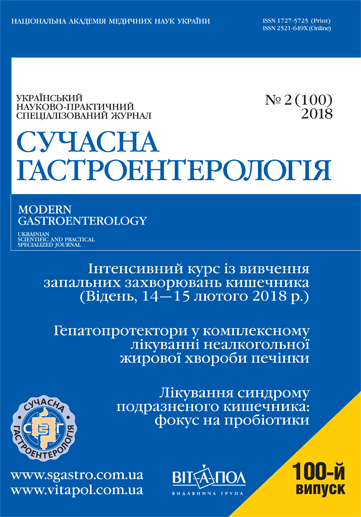Роль кишкової мікробіоти в розвитку метаболічних порушень
Ключові слова:
кишкова мікробіота, метаболічний синдром, пробіотик, «Пробіокс», терапевтичний потенціалАнотація
Людська кишка містить понад 100 трлн мікроорганізмів, які відіграють важливу роль у регуляції метаболізму людини за допомогою симбіотичних взаємодій з господарем. Змінені кишкові мікробні екосистеми пов’язані зі збільшенням метаболічних та імунних порушень. Уточнено молекулярні взаємодії, які пов’язують кишкову мікробіоту з енергетичним метаболізмом господаря, накопиченням ліпідів та імунітетом. Проте точні механізми, за допомогою яких певні зміни у складі мікробіоти кишечника впливають на розвиток ожиріння та метаболічних захворювань у людей, не з’ясовано через складну етіологію цих патологій. Розглянуто основні функції кишкової мікробіоти у пацієнтів з метаболічними порушеннями. Представлено досвід застосування пробіотика «Пробіокс», який чинить комплексну дію на макроорганізм за рахунок підвищення резистентності колонізації кишечника, зниження вираженості запальних процесів, поліпшення загального соматичного стану, що розширює його клінічне застосування для пацієнтів з різними виявами метаболічного синдрому і дисфункцією кишечника.Посилання
Chassaing B, Gewirtz AT. Has provoking microbiota aggression driven the obesity epidemic?. Bioessays. 2016;38:122-128. doi: 10.1002/bies.201500116.
Clarke G, Stilling RM, Kennedy PJ et al. Minireview: Gut microbiota: the neglected endocrine organ. Mol Endocrinol. 2014;28:1221-1238. doi: 10.1210/me.2014-1108.
Colman RJ, Rubin DT. Fecal microbiota transplantation as therapy for inflammatory bowel disease: a systematic review and meta-analysis. J Crohns Colitis. 2014;8 (12):1569-1581. doi: 10.1016/j.crohns.2014.08.006.
Cotillard A, Kennedy SP, Kong LC et al. Dietary intervention impact on gut microbial gene richness. Nature. 2013;500:585-8. doi:10.1038/nature12480.
David LA, Maurice CF, Carmody RN et al. Diet rapidly and reproducibly alters the human gut microbiome. Nature. 2014;505:559-563. doi: 10.1038/nature12820.
De Vadder F, Kovatcheva-Datchary P, Goncalves D et al. Microbiota-generated metabolites promote metabolic benefits via gut-brain neural circuits. Cell. 2014;156:84-96. doi: 10.1016/j.cell. 2013.12.016.
Garidou L, Pomie C, Klopp P et al. The gut microbiota regulates intestinal CD4 T cells expressing RORgammat and controls metabolic disease. Cell Metab. 2015;22:100-112. doi: 10.1016/j.cmet. 2015.06.001.
Grant RW, Dixit VD. Mechanisms of disease: inflammasome activation and the development of type 2 diabetes. Front Immunol. 2013;4:50. doi: 10.3389/fimmu.2013.00050.
Harte AL, Varma MC, Tripathi G et al. High fat intake leads to acute postprandial exposure to circulating endotoxin in type 2 diabetic subjects. Diabetes Care. 2012;35:375-382. doi: 10.2337/dc11-1593.
Hill C, Guarner F, Reid G et al. Expert consensus document. The International Scientific Association for Probiotics and Prebiotics consensus statement on the scope and appropriate use of the term probiotic. Nat Rev Gastroenterol Hepatol. 2014;11:506-514. doi: 10.1038/nrgastro.2014.66.
Ivey KL, Hodgson JM, Kerr DA et al. The effects of probiotic bacteria on glycaemic control in overweight men and women: a randomised controlled trial. Eur J Clin Nutr. 2014;68:447-452. doi: 10.1038/ejcn.2013.294.
Kobyliak N, Conte C, Cammarota G et al. Probiotics in prevention and treatment of obesity: a critical view. Nutr Metab (Lond). 2016;13:14. doi: 10.1186/s12986-016-0067-0.
Le Chatelier E, Nielsen T, Qin J et al. Richness of human gut microbiome correlates with metabolic markers. Nature. 2013;500:541-546. doi: 10.1038/nature12506.
Li YT, Cai HF, Wang ZH et al. Systematic review with meta-analysis: long-term outcomes of faecal microbiota transplantation for Clostridium difficile infection. Aliment Pharmacol Ther. 2016;43:445-457. doi: 10.1111/ apt.13492.
Marchesi JR, Adams DH, Fava F et al. The gut microbiota and host health: a new clinical frontier. Gut. 2016;65(2):330-339. doi: 10.1136/gutjnl-2015-309990.
Murphy EF, Cotter PD, Healy S et al. Composition and energy harvesting capacity of the gut microbiota: relationship to diet, obesity and time in mouse models. Gut. 2010;59:1635-1642. doi: 10.1136/gut.2010.215665.
Neves AL, Chilloux J, Sarafian MH et al. The microbiome and its pharmacological targets: therapeutic avenues in cardiometabolic diseases. Curr Opin Pharmacol. 2015;25:36-44. doi: 10.1016/j. coph.2015.09.013.
Parseus A, Sommer N, Sommer F et al. Microbiota-induced obesity requires farnesoid X receptor. Gut. 2017;66(3):429-437. doi: 10.1136/gutjnl-2015-310283.
Perry RJ, Samuel VT, Petersen KF, Shulman GI. The role of hepatic lipids in hepatic insulin resistance and type 2 diabetes. Nature. 2014;510:84-91. doi: 10.1038/nature13478.
Rajilic-Stojanovic M, de Vos WM. The first 1000 cultured species of the human gastrointestinal microbiota. FEMS Microbiol Rev. 2014;38(5):996-1047. doi: 10.1111/1574-6976.12075.
Rajkumar H, Mahmood N, Kumar M et al. Effect of probiotic (VSL#3) and omega-3 on lipid profile, insulin sensitivity, inflammatory markers, and gut colonization in overweight adults: a randomized, controlled trial. Mediators Inflamm. 2014;2014:348959. doi: 10.1155/2014/348959.
Ridaura VK, Faith JJ, Rey FE et al. Gut microbiota from twins discordant for obesity modulate metabolism in mice. Science. 2013;341:1241214. doi: 10.1126/science.1241214.
Rodriguez JM, Murphy K, Stanton C et al. The composition of the gut microbiota throughout life, with an emphasis on early life. Microb Ecol Health Dis. 2015;26:26050. doi: 10.3402/mehd.v26. 26050.
Saito I. Epidemiological evidence of type 2 diabetes mellitus, metabolic syndrome, and cardiovascular disease in Japan. Circ J. 2012;76:1066-1073.
Sanchez M, Darimont C, Drapeau V et al. Effect of Lactobacillus rhamnosus CGMCC1.3724 supplementation on weight loss and maintenance in obese men and women. Br J Nutr. 2014;111:1507-1519. doi: 10.1017/S0007114513003875.
Shi H, Kokoeva MV, Inouye K et al. TLR4 links innate immunity and fatty acid-induced insulin resistance. J Clin Invest. 2006;116:3015-3025. doi: 10.1172/JCI28898.
Turnbaugh PJ, Ley RE, Mahowald MA et al. An obesity-associated gut microbiome with increased capacity for energy harvest. Nature. 2006;444:1027-1031. doi: 10.1038/nature05414.
Ussar S, Griffin NW, Bezy O et al. Interactions between gut microbiota, host genetics and diet modulate the predisposition to obesity and metabolic syndrome. Cell Metab. 2015;22(3):516-530. doi: 10.1016/j.cmet.2015.07.007.
Venkatesh M, Mukherjee S, Wang H et al. Symbiotic bacterial metabolites regulate gastrointestinal barrier function via the xenobiotic sensor PXR and Toll-like receptor 4. Immunity. 2014;41:296-310. doi: 10.1016/j.immuni.2014.06.014.
Verges B, Duvillard L, Lagrost L et al. Changes in lipoprotein kinetics associated with type 2 diabetes affect the distribution of lipopolysaccharides among lipoproteins. J Clin Endocrinol Metab. 2014;99. P. E1245-1253. doi: 10.1210/jc.2013-3463.
Vulevic J, Juric A, Tzortzis G, Gibson GR. A mixture of trans-galactooligosaccharides reduces markers of metabolic syndrome and modulates the fecal microbiota and immune function of overweight adults. J Nutr. 2013;143(3):324-331. doi: 10.3945/jn.112.166132.
World Health Organization (WHO). Obesity and overweight. January 2015. http://www.who.int/mediacentre/factsheets/fs311/en/. Accessed 2 April 2016
Zhang C, Yin A, Li H et al. Dietary modulation of gut microbiota contributes to alleviation of both genetic and simple obesity in children. EBioMedicine. 2015;2(8):968-984. doi: 10.1016/j.ebiom.2015.07.007.





